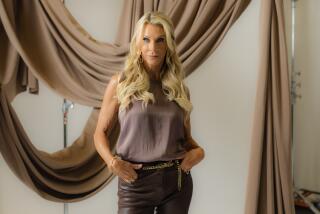TV’s big noisemaker -- and proud of it
- Share via
Mike Fleiss is 6-foot-4, broad-shouldered, with long, close-shaven sideburns that form parentheses on either side of his face. He wears sunglasses during staff meetings and talks to his agent 10 times a day. Fleiss’ second cousin is Heidi Fleiss, the infamous ex-Hollywood madam. But Mike Fleiss says the two are not really that close.
As a TV producer, a macher-in-progress, Fleiss, who is 38, has two offices -- one in the old Sherman Oaks Galleria, where he runs “The Bachelor,” his hit ABC series whose second season climaxes tonight at 9, and another one on the Warner Bros. lot that Fleiss says used to belong to Tom Selleck. “I hardly ever go there,” Fleiss said of the Selleck office, which he got when he signed a deal two years ago with Warner Bros.’ Telepictures Productions. “It’s awesome, it’s got a shower.”
Showering is what some people feel like doing after watching the television Fleiss makes, which before “The Bachelor” included cut-and-paste jobs like “Before They Were Stars” and, later, “Who Wants to Marry a Multi-Millionaire.” That Fox special drew great ratings but was promptly engulfed in scandal, when it was revealed that producers -- namely, executive producer Fleiss -- had failed to discover a restraining order in groom Rick Rockwell’s past.
The episode briefly derailed his career -- but ever so briefly -- and in the end it more than likely helped, because it proved that Mike Fleiss could create noise. According to Fleiss, who at the time was hiding from the media while Fox conducted damage control, two rival network presidents called him in the midst of the scandal to see if he could duplicate the on-air shotgun marriage for them. A short time later Fox -- after Sandy Grushow, the studio’s top TV executive, loudly declared his network was out of the shock business -- bought two more of Fleiss’ shows. The concepts, to Fleiss’ way of thinking, weren’t all that chancy, but a sale is a sale. One of the specials was called “Million Dollar Mysteries” and the other “Battle of the Child Geniuses.” Citing “Butch Cassidy and the Sundance Kid,” Fleiss calls this his Bolivia period.
“It’s true what they say, man,” Fleiss said of the TV business during an interview in his office last week, where framed posters on the wall suggest his cultural influences (Jimi Hendrix, “The Texas Chainsaw Massacre”). “They don’t care. If you’ve got what they want, they’ll buy it.”
They are now. On Tuesday, ABC announced it was picking up another show from Fleiss’ Next Entertainment, this one called “Are You Hot?,” described as a talent search for the sexiest person in America. In addition to “The Bachelor,” three other Fleiss series are either in production or have received network pickups: “The Bachelorette” for ABC; “High School Reunion” for the WB; and “The Will,” in which an actual family will fight over an actual rich guy’s will. The show, picked up by ABC, is still in search of a family amenable to airing its dirty laundry on national TV. It seems safe to say Fleiss will locate one.
Should all four of these shows fulfill their network orders, Fleiss will be responsible for more prime-time shows than many top producers in the business, including David E. Kelley and Steven Bochco.
Fleiss’ ascension, you could say, mirrors the networks’ deepening commitment to staged reality television, despite howls of protest from social commentators and embarrassing behind-the-scenes gaffes like the Rockwell imbroglio.
Today, none of that matters. Fleiss’ “Bachelor” is outperforming “The West Wing” Wednesday nights at 9, averaging nearly 14 million viewers and, more importantly, outpacing the competition among young viewers, particularly females.
From an economic standpoint, “The Bachelor” is doing what countless costly ABC situation comedies and dramas have failed to do: Draw young viewers to the network and create a PR splash, featuring civilians as stars -- neophytes who are both grateful for the opportunity and easily replaced.
Tonight on “The Bachelor,” millions will watch Missouri banker Aaron Buerge choose either Helene or Brooke, the final beauties culled from a crop of 25.
“As a programmer, I love this show. As a woman, I’m really intrigued by it,” said Susan Lyne, entertainment president at ABC, which recently signed Fleiss to a multiyear development deal. “It’s not a mean-spirited show. If anything, it’s like the big debutante ball where there are lots of eligible girls and a guy who’s deciding which one he wants to ask to dance.”
Fleiss knows his shows lack complex, fully developed characters, and that reality concepts tend to flame out of their own accord. In this universe, the concepts currently in fashion matter less than the ability to keep generating new twists on what’s working, something that will have a short, but spectacular, run on TV before the next distraction comes along.
This is a game that Fleiss -- who grew up in Fullerton and attended UC Berkeley, where he gravitated toward journalism -- has been playing since he landed his first real job in television in the early ‘90s, writing stunts for the Fox show “Totally Hidden Videos.” He was in his 20s, his wife pregnant, writing up treatments for funny stuff you could do to unsuspecting people with a hidden camera.
“I wanted it so bad, dude,” Fleiss said of the hidden videos job. “I wanted it so [expletive] bad.”
At first, Fleiss proved adept at canvassing the country for videotape, cold-calling and trolling the Internet for footage to license, something you could package as, say, Fox’s “World’s Scariest Police Shoot-outs.” In the course of his early travels in the frontiers of shock TV, he befriended others who today play a big role in the genre -- Mike Darnell, Fox’s executive vice president of alternative programming and specials, and Bruce Nash, with whom Fleiss worked on such shows as “Breaking the Magicians’ Code,” before the two had a falling out and became rival producer/salesmen.
A former Fleiss show staffer summed up his talents this way: If anyone could pitch a show in which you either win a Range Rover or get killed on national TV, it’s Fleiss.
“I’ve never given away a Range Rover,” Fleiss deadpanned. “I don’t even like Range Rovers.”
Recycled ‘Bachelorette’
Around the office, Fleiss has a reputation for wearing shorts and flip-flops, but Friday he was dressed professionally -- jeans, black boots, a black shirt and black leather jacket.
During an interview, he took a call from Trista Rehn.
“What are you doing, honey?” he said.
Rehn, a former cheerleader for the NBA’s Miami Heat, was the hard-luck loser on the first installment of “The Bachelor,” surviving the cut from 25 women to become one of two finalists, before Alex Michel, the Stanford MBA, chose to ride off into the TV sunset with Amanda Marsh, an events planner from Kansas.
But Fleiss the master recycler has recast Rehn for “The Bachelorette”: This time, Trista gets to choose from her own pool of pining men, all of whom, like the female contestants on “The Bachelor,” are conventionally attractive, in the kind of objectified way that prompted the National Organization for Women recently to state: “Sexual exploitation has reached a new low on programs like ‘The Bachelor.’ ”
Fleiss is running too fast to care about such matters. In the opening minutes of “The Bachelorette,” Rehn, looking a little terrified but determined, stands in front of her soft-core Cinderella pad (a giant rented home in Encino) as a series of square-jawed and moussed men climb out of limousines and greet her awkwardly.
According to Fleiss, 600 hours of footage of Trista being wooed, Trista wooing back, Trista being fought over and Trista being discussed have already been shot; now the job is to whittle the raw film down to six hours of prime-time television.
“The thing that’s an enemy of the show is camaraderie among the guys,” Fleiss told 25 of his staffers during a story meeting. He wanted footage of “guys trashing guys,” particularly during their ITMs (reality-showspeak for “in the moment” interviews”). There was conflict in those 600 hours, and finding it involved reducing the men to easily recognized stereotypes and then conjuring whatever tension there was to be conjured in the editing room. Around a conference table littered with pizza boxes, there was talk of “the chiseler,” and “the nerd guy” and “Mr. Schadenfreude.” “The chiseler,” you could tell, was an emerging character.
Casting, Fleiss said, involves weeding out the people simply looking for a way into show business, something the syndicated dating shows like “Blind Date” don’t do, he claimed. People try out for shows like “The Bachelor” because “it’s an adventure and it’s a new experience and I think that’s attractive to a larger sector of people than you would think,” Fleiss said.
Background checks, a subject Fleiss learned about the hard way, include blood tests for sexually transmitted diseases. A third of the people brought in for casting, Fleiss said, get dismissed because they test positive for herpes.
“Now there’s a whole industry of these background-check companies, and whenever I hire one of them they all come in and thank me, because I put them all in business.”
He was referring to “Who Wants to Marry a Multi-Millionaire.” When Fleiss was making the show for Fox, he says, the network had only one vague directive: “Make sure the guy’s a good guy.”
The title for the show came from Fox’s Darnell, who then turned to his old friend Fleiss to produce it.
This was at the end of 1999. At the time, Darnell and Fleiss were going to crash a plane in the desert for a special called “Jumbo Jet Crash: The Ultimate Safety Test,” before Fox backed down. Instead they did “Multi-Millionaire,” concocting a sensation on the fly, only to touch off a media backlash. An ex-girlfriend of Rockwell’s, it was revealed, had taken out a restraining order against him. Further questions arose surrounding Rockwell’s “millionaire” status and bride Darva Conger’s claims of being a Gulf War veteran.
The debacle, some said, was the result of a producer in over his head. Today, Fleiss says he would attempt the show again, because it was good TV. Further, he feels vindicated that subsequent reality series, including CBS’ “Survivor” and “Big Brother,” encountered some of the same problems with contestants that “Who Wants to Marry a Multimillionaire” did.
“I don’t take this stuff seriously,” Fleiss said of the notion that his shows are corrosive or harmful. “I really don’t. Even Darva herself made millions posing for Playboy. You think she’s not happy she did that? Call her at her beach house and find out.”
More to Read
The complete guide to home viewing
Get Screen Gab for everything about the TV shows and streaming movies everyone’s talking about.
You may occasionally receive promotional content from the Los Angeles Times.






